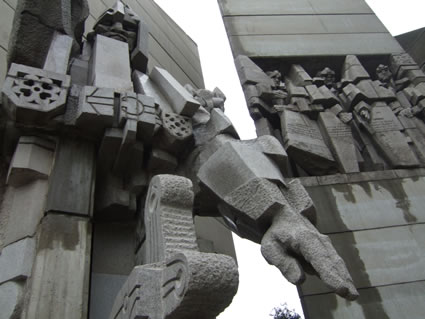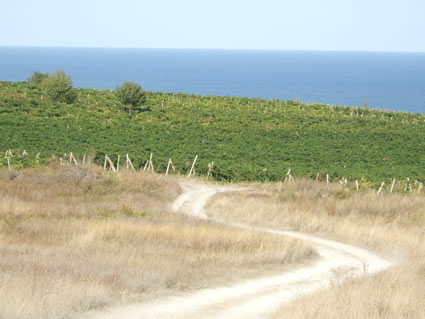How To Dislike a Destination
Article and photos by Robert Reid
2/2014

|
|
A hilltop monument in Shumen, Bulgaria built to celebrate Bulgaria's 1300th birthday.
|
“Bulgaria’s boring.”
I’ve heard that plenty. I’ve spent months in that off-the-radar Balkan nation where some locals shake their head “yes” — or, more confusingly, douse pizza with ketchup. Bulgaria can be gorgeous and surprising, but Sofia — the often gray, modernist capital — isn’t exactly its finest moment. But for many visitors who “do Bulgaria” in a couple days, it’s only Sofia they see before shooting off to Greece or Turkey.
Some say things like this:
A: “Yeah, I didn’t get much out of Sofia. It was cold and hard to get around, and so many people seemed indifferent. I doubt I’ll be back anytime soon.”
B: “Bulgaria is boring. Bulgarians are rude, and don’t like foreigners. And there’s nothing really to see either.”
Here’s the difference. “A” is talking about their unpleasant experience in Sofia, which is fine, while “B” seems to be auditioning to be a “talking head” analyst on TV. They’ve stopped being a traveler, to craft a conclusion of a place, culture and people after the narrowest of glimpses there.
That seems quite a burden to bear from something that’s supposed to be fun.

|
|
A dirt road through vineyards to an untouched patch of beaches on the Black Sea coast of Bulgaria.
|
Smearing any place as “boring” based on a breezy, pop-in visit is like saying “Kansas is ugly” based on the view from I-70, or “Parisians are rude” because the Metro guy didn’t explain the separate RER train. Or even “Thailand is the world’s nicest place” because of a super friendly noodle-seller.
I’m sorry, but no one is that perceptive.
In the 2005 book Blink, Malcolm Gladwell writes about the power of “thin-slicing,” or snap judgments. In it, he describes an art historian — an expert — who sees an Ancient Greek statue worth $10 million, and immediately dismisses it as a fake. Rightly, it turns out.
Such gut reactions often work well in travel. Like picking a beach bungalow that “feels homey,” or avoiding an unlit alley that seems dodgy. It doesn’t do so well for judging places or peoples.
My first time in Thailand was a complete disappointment. I don’t know what I expected, but it wasn’t what I found: tuk-tuk drivers who overcharged me and took me to the wrong places, smoggy highways and traffic jamming a capital I had thought would be as atmospheric as its name. I couldn’t even find the “Thai iced teas” I loved at Thai restaurants back home.
Skeptical of my reaction, I’ve returned a few times, and each time liked it more. (It probably didn’t hurt that I had figured out how not to get scammed by touristy tuk-tuks.)
Many people who have a bad time in a place don’t return. It’s understandable: the world is big and time and budget limited. But, at the same time, it’s a mistake to make some sort of damning verdict of the place, or declare a life-long “ban.” It’s taking “dislike” too far, too seriously.
This happens when travelers treat destinations like restaurants.
If the folks down the street at Taquería Jeff make you an unremarkable taco, verrrry slowly, frown when you ask for the correct change, and then your stomach starts to rumble afterwards, well, you’re not likely to go back. (I wouldn’t.) You could even say it’s not a great restaurant. (And perhaps one without much of a future too.)
But Texas, the Gran Chaco and the Russian people aren’t taco stands. They aren’t set up to serve you. Though we spend money there, we aren’t customers of the culture. In most cases, we aren’t even guests, but unannounced, drop-in visitors.
After over 20 years of long-haul trips, often done solo, I’ve learned to follow a journalistic impulse — and distrust my first reactions, particularly the negative ones. Sydney often wins travelers’ polls for favorite city. But a decade ago in Australia, I didn’t find it living up to its hype. I preferred Melbourne. I had better coffee, wine and laksa noodles there. Record stores and “footie” games were easier to find too. Ultimately I think Melbourne’s more my kind of town, but I’ve always assumed any “failure” with Sydney was on me. I’d surely enjoy it more if I return.
This is what travel teaches us. Landscapes are one thing. But where there’s people — people who carry plastic bags of groceries in each hand onto trams, chat on benches by heroic monuments in decaying parks, go to 3D movie theaters that sell microbrew beers, watch puppet shows or punk bands on raised stages in street fairs, eat fried snacks from plastic stools on cracked sidewalks, laugh at loudly busted balloons, cry over skinned knees and broken hearts — then there’s a way. Because people want to like you more than cheat you. That’s true everywhere. And when that’s a truth, there’s a way to find you ultimately don’t dislike a place. Any place.
It’s not up to the destination to deliver this with a bow. It’s up to us, the travelers, to seek it out. And if we don’t find it, it’s not our fault either. As long as we accept that our time there, ultimately, remains an “incomplete.”
Even if we never expect to go back.
Robert Reid has written a couple dozen Lonely Planet guidebooks, talked travel on TV shows like the Today Show and CNN Headline News, and writes regularly for National Geographic Traveler. This is one of his monthly columns for Transitions Abroad on “How to Enjoy the World.” He lives in Portland, Oregon.
|
